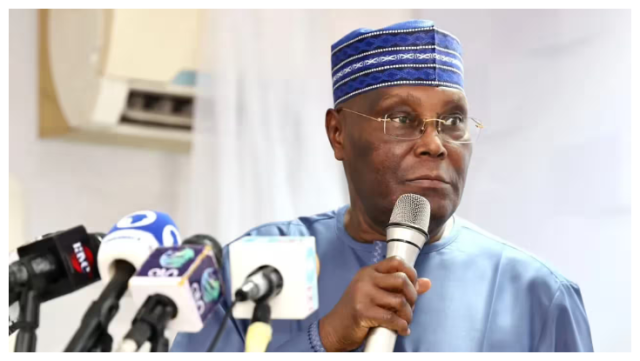In a recent exchange highlighting the growing tensions in Nigeria's political landscape, former Vice President Atiku Abubakar, the presidential candidate for the Peoples Democratic Party (PDP), publicly criticized President Bola Tinubu's administration's economic policies. This confrontation comes when Nigeria's economy faces significant challenges, and the dialogue between the two leaders is crucial in understanding the country's path forward.
In a statement released yesterday, Atiku aimed at Tinubu's handling of Nigeria's economy, suggesting that the president should reconsider his approach and adopt elements from Atiku's policy manifesto. He urged Tinubu to "eat the humble pie" and recognize the pressing need for effective economic reforms that would alleviate the hardships faced by ordinary Nigerians. Atiku's remarks reflect a broader discontent among the populace regarding the current financial situation, which has characterised inflation, high unemployment rates, and increased living costs.
Atiku emphasized, "I am not the president; Tinubu is. The focus should be on him and not on me or any other. I believe such inquiries distract from the critical questions of what Tinubu needs to do to save Nigerians from the excruciating pains arising from his trial-and-error economic policies." This statement underscores Atiku's position that the incumbent must address the economic crisis rather than deflect attention to political rivals.
Atiku acknowledged the challenges citizens face in seeking alternatives to ineffective policies. He hoped Tinubu and his administration would be open to learning from the PDP's proposals, which he believes could lead to substantial economic improvements. "I hope Tinubu and members of his administration are humble enough to borrow one or two things from our ideas in the interest of the Nigerian people," he stated.
In outlining his approach, Atiku highlighted a key area of concern: the removal of fuel subsidies. He has long advocated for this change, arguing that the management of subsidies has been plagued by opacity and corruption. He criticized the existing system, stating that it primarily benefits a select group of government and private sector elites while ordinary Nigerians continue to suffer.
Related Articles:
- Atiku Supports Anti-Damagum NWC Members Amid Crisis in PDP
- Atiku Bode George Differ Over 2027 Presidential Bid
- Hardship Protests: Atiku, Obi, NLC Advise Presidency to Address Nigerians
- Atiku Wants Traditional Institution Reforms to End Insecurity
- Eid-el-Kabir: Tinubu, Atiku, Govs Call for Unity & Peace
Atiku's statement included a commitment to articulate policies that could transform Nigeria's economy. He suggested that a comprehensive approach to subsidy removal could help redirect funds towards essential public services and infrastructure, thereby fostering economic growth. He emphasized transparency and accountability in financial management to restore public trust.
In response to Atiku's critiques, the presidency defended its record, arguing that Nigeria would have faced even graver economic challenges if Atiku had won the presidential election held in March last year. This assertion aims to undermine Atiku's criticisms by suggesting that his leadership would have been ineffective in addressing the issues he now highlights.
The ongoing debate between Atiku Abubakar and President Bola Tinubu reflects the deep divisions within Nigeria's political landscape, mainly concerning economic policy and governance. As both leaders articulate their visions for the country's future, the Nigerian populace is left to navigate the complexities of their statements and the realities of an economy that remains in distress. The dialogue surrounding policy reform, accountability, and transparency in governance will be crucial as Nigeria seeks to overcome its current economic difficulties.




















